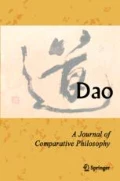Abstract
This essay considers how the Zhuangzi 莊子 sheds light on a new direction to the contemporary discussion of desires. Harry Frankfurt proposes an account of personhood based on a hierarchy of desires. He defines a wanton as a being that does not have second-order volitions, the desires that a certain desire of action becomes her will. J. David Velleman proposes, in the context of the Zhuangzi, that when a Daoist sage performs her skills she can be regarded as a “higher” wanton because her actions are spontaneous flows of skillful actions. In this essay, I propose along the line of Velleman a constructive interpretation of the Zhuangzian way to deal with desires from my reading of the Zhuangzi. I argue that there are two roles a Daoist sage can play: the observer and the performer. A Daoist sage can be an observer at a certain time and a performer at other times. Although a performer can be regarded as a higher wanton, it is inappropriate to regard an observer as a wanton. Also, I propose that observation is a means to transform desires—once the practitioner achieves high spirituality, one does not need to possess second-order volitions because one’s first-order desires are transformed such that they are in accordance with the Dao 道.
Similar content being viewed by others
References
Cline, Erin M. 2008. “Mirrors, Minds, and Metaphors.” Philosophy East and West 58.3: 337–357.
Dai, Mingyang 戴明揚. 2014. Collected Work of JiKang: With Annotations and Commentaries 嵇康集校注. Beijing 北京: Zhonghua Shuju 中華書局.
Frankfurt, Harry G. 1971. “Freedom of the Will and the Concept of a Person.” Journal of Philosophy 68.1: 5–20.
______.1987. “Identification and Wholeheartedness.” In Responsibility, Character, and the Emotions: New Essays in Moral Psychology, edited by Ferdinand David Schoeman. New York: Cambridge University Press.
Graham, Angus C. 1989. Chuang-Tzu: The Inner Chapters. London: Unwin Paperbacks.
Hansen, Chad. 1983. “A Dao of Dao in Chuang-tzu.” In Experimental Essays on Chuang-tzu, Asian Studies at Hawaii, No. 29, edited by Victor H. Mair. Honolulu: University of Hawaii Press.
Huang, Yong 黃勇. 2010. “Respecting Different Ways of Life: A Daoist Ethics of Virtue in the ‘Zhuangzi.’” The Journal of Asian Studies 69.4: 1049–1069.
Ivanhoe, Philip J. 1993. “Zhuangzi on Skepticism, Skill, and the Ineffable Dao.” Journal of the American Academy of Religion 61.4: 639–654.
Klein, Esther. 2010. “Were There ‘Inner Chapters’ in the Warring States? A New Examination of Evidence about the Zhuangzi.” T’oung Pao, Second Series 96. 4/5: 299–369.
Liu, Xiaogan 劉笑敢. 1993. Zhuangzi’s Philosophy and Its Development 莊子哲學及其演變. Beijing 北京: Zhongguo Shehui Kexue Chubanshe 中國社會科學出版社.
______. 1994. Classifying the Zhuangzi Chapters. Ann Arbor: Center for Chinese Studies, University of Michigan.
______. 2015. “Textual Issues in the Zhuangzi.” In Dao Companion to Daoist Philosophy, edited by Xiaogan Liu. Dordrecht and New York: Springer.
Mou, Zongsan 牟宗三. 1962. Wei-Jin Profound Studies 魏晉玄學. Taichung 台中: Donghai Daxue 東海大學.
Slingerland, Edward. 2003. Effortless Action: Wu-Wei as Conceptual Metaphor and Spiritual Ideal in Early China. Oxford: Oxford University Press.
Tang, Yijie 湯一介. 2000. GuoXiang and Wei-Jin Profound Studies 郭象與魏晉玄學. Beijing 北京: Beijing Daxue Chubanshe 北京大學出版社.
Velleman, J. David. 2008. “The Way of the Wanton.” In Practical Identity and Narrative Agency, edited by Kim Atkins and Catriona Mackenzie. New York: Routledge.
Watson, Burton. 2013. The Complete Works of Chuang Tzu. New York: Columbia University Press.
Wenzel, Christian H. 2003. “Ethics and Zhuangzi: Awareness, Freedom, and Autonomy.” Journal of Chinese Philosophy 30: 115–126.
Yearley, Lee H. 1980. “Hsün Tzu on the Mind: His Attempted Synthesis of Confucianism and Daoism.” The Journal of Asian Studies 39.3: 465–480.
______. 1996. “Zhuangzi’s Understanding of Skillfulness and the Ultimate Spiritual State.” In Essays on Skepticism, Relativism, and Ethics in the Zhuangzi, edited by Paul Kjellberg and Philip J. Ivanhoe. Albany: State University of New York Press.
Ziporyn, Brook. 2003. The Penumbra Unbound: The Neo-Taoist Philosophy of GuoXiang. New York: State University of New York Press.
Zongbao 宗寶, ed. 2016. Platform Sutra of the Sixth Patrich 六祖大師法寶壇經, juan 1, chapter 2 “Prajna” 般若第二. In Taishō Tripiṭaka 大正藏, vol. 48, no. 2008. CBETA.
Acknowledgment
I am extremely thankful to (in alphabetical order) Derek Clayton Baker, Wai-wai Chiu, Kim Chong Chong, Yong Huang, Philip J. Ivanhoe, Andrea Sauchelli, Eric Schwitzgebel, and Winnie Sung for their teaching, comments, and advice. I am also grateful to the anonymous reviewers for their detailed suggestions. This article was presented at the Singapore-Hong Kong-Macau Symposium on Chinese Philosophy Meeting in 2016. I am grateful to the audience for their feedback.
Author information
Authors and Affiliations
Corresponding author
Additional information
Publisher’s Note
Springer Nature remains neutral with regard to jurisdictional claims in published maps and institutional affiliations.
Rights and permissions
About this article
Cite this article
Hung, J. Is Zhuangzi a Wanton? Observation and Transformation of Desires in the Zhuangzi. Dao 19, 289–305 (2020). https://doi.org/10.1007/s11712-020-09723-2
Published:
Issue Date:
DOI: https://doi.org/10.1007/s11712-020-09723-2



